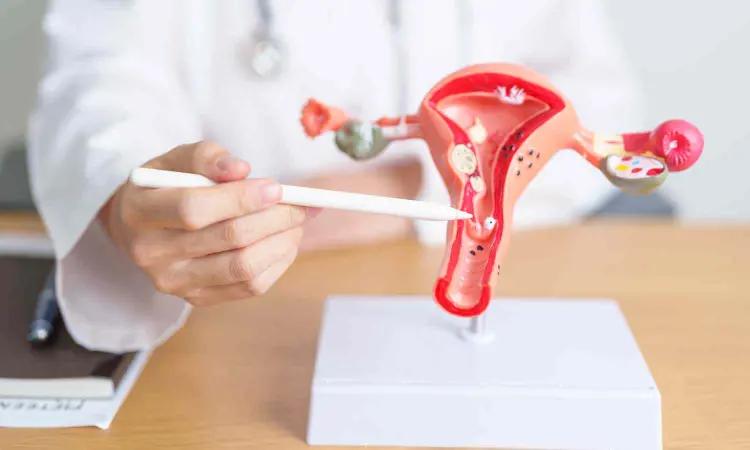- Home
- Medical news & Guidelines
- Anesthesiology
- Cardiology and CTVS
- Critical Care
- Dentistry
- Dermatology
- Diabetes and Endocrinology
- ENT
- Gastroenterology
- Medicine
- Nephrology
- Neurology
- Obstretics-Gynaecology
- Oncology
- Ophthalmology
- Orthopaedics
- Pediatrics-Neonatology
- Psychiatry
- Pulmonology
- Radiology
- Surgery
- Urology
- Laboratory Medicine
- Diet
- Nursing
- Paramedical
- Physiotherapy
- Health news
- Fact Check
- Bone Health Fact Check
- Brain Health Fact Check
- Cancer Related Fact Check
- Child Care Fact Check
- Dental and oral health fact check
- Diabetes and metabolic health fact check
- Diet and Nutrition Fact Check
- Eye and ENT Care Fact Check
- Fitness fact check
- Gut health fact check
- Heart health fact check
- Kidney health fact check
- Medical education fact check
- Men's health fact check
- Respiratory fact check
- Skin and hair care fact check
- Vaccine and Immunization fact check
- Women's health fact check
- AYUSH
- State News
- Andaman and Nicobar Islands
- Andhra Pradesh
- Arunachal Pradesh
- Assam
- Bihar
- Chandigarh
- Chattisgarh
- Dadra and Nagar Haveli
- Daman and Diu
- Delhi
- Goa
- Gujarat
- Haryana
- Himachal Pradesh
- Jammu & Kashmir
- Jharkhand
- Karnataka
- Kerala
- Ladakh
- Lakshadweep
- Madhya Pradesh
- Maharashtra
- Manipur
- Meghalaya
- Mizoram
- Nagaland
- Odisha
- Puducherry
- Punjab
- Rajasthan
- Sikkim
- Tamil Nadu
- Telangana
- Tripura
- Uttar Pradesh
- Uttrakhand
- West Bengal
- Medical Education
- Industry
Study explores current state and research innovation in endometrial cancer screening

Endometrial cancer (EC) ranks among the top three gynecologic malignancies globally, with rising incidence in younger populations driven by obesity, metabolic disorders, and lifestyle factors. Despite its prevalence, effective population-level screening remains elusive due to limitations in current methods: transvaginal ultrasound (TVU) exhibits moderate specificity (60–70%), cytology sensitivity is ≤50% in community settings, and histopathology is invasive. This review synthesizes advances in EC screening, highlighting emerging technologies poised to transform early detection.
Current Screening Modalities: Limitations and Gaps
Clinical Symptoms & Imaging:
• Vaginal bleeding is the primary symptom but lacks specificity due to overlap with benign conditions.
• TVU detects endometrial thickening (>4 mm in postmenopausal women) but misses 35% of early-stage/hormone-independent tumors (Type II EC). Sensitivity: 80–90%; specificity: 60–70%.
Tumor Markers:
• CA125 and HE4 correlate with advanced disease but lack utility for early detection. HE4 specificity is compromised by heterogeneity across studies.
Histopathology:
• Gold standard but invasive, with risks of complications and low patient compliance. Novel samplers (e.g., Pipelle, Tao Brush) enable outpatient cytology yet face challenges in detecting focal lesions.
Innovative Screening Technologies
1. Molecular & Epigenetic Biomarkers
• DNA Methylation Panels (e.g., ADCYAP1, HAND2):
• Phase II trials show 89–94% sensitivity and 91–97% specificity in liquid biopsies.
• Enables non-invasive early detection and monitoring of high-risk groups (e.g., Lynch syndrome).
• Genomic Profiling:
• Mutations in PTEN, TP53, and ARID1A achieve 92.9% sensitivity for hereditary EC.
• Exosomal miRNA:
• Plasma exosomal miR-15a-5p distinguishes EC patients (AUC: 0.823) and correlates with myometrial invasion depth.
2. Liquid Biopsy & Spectroscopy
• Circulating Tumor DNA (ctDNA):
• Combined with tumor-educated platelets, sensitivity reaches 77.8% for early-stage EC. Challenges include standardization and high cost.
• Vibrational Spectroscopy:
• Detects molecular changes in tissues/blood with 87% sensitivity and 78% specificity. Enables rapid intraoperative diagnosis.
3. AI-Driven Platforms
• Risk Prediction Models:
• Integrate demographic, imaging, and biomarker data (e.g., AI-enhanced Risk of Malignancy Index: 94% sensitivity, 75% specificity).
• Cytology Analysis:
• Deep learning algorithms classify benign/malignant cells (95% positive predictive value).
Implementation Strategies
1. Risk Stratification
• High-Risk Groups: Obesity (BMI >30), Lynch syndrome, diabetes, nulliparity, and late menopause (>55 years).
• Lynch Syndrome: Annual TVU + endometrial biopsy from age 30–35.
2. Fertility Preservation
• Early-stage EC: Progestins, levonorgestrel IUDs, or GnRH agonists enable fertility-sparing treatment with 3–6 month follow-ups.
3. Economic & Ethical Considerations
• Cost-Effectiveness: AI and methylation testing reduce long-term costs by minimizing invasive procedures (e.g., Nordic studies show 20% cost reduction over 5 years).
• Ethical Priorities: Minimize invasiveness, address false-positive anxiety, and ensure equitable access.
Future Directions
Multimodal Screening: Combine methylation panels, exosomal miRNAs, and AI for community-level deployment.
Large-Scale Validation: Prospective trials to confirm biomarker efficacy across diverse populations.
Policy Integration: Develop guidelines for risk-stratified screening and subsidize high-accuracy tests (e.g., methylation panels).
Conclusion
Endometrial cancer screening is evolving from symptom-dependent approaches to precision strategies leveraging molecular biomarkers, AI, and non-invasive diagnostics. Key innovations—methylation panels (sensitivity >90%), vibrational spectroscopy, and exosomal miRNAs—offer transformative potential for early detection. Prioritizing risk-adapted frameworks, cost-effective implementation, and ethical deployment will be critical to reducing EC mortality globally.
Reference:
Liu H, Ai H, Liu Y. Exploring the Current State and Research Innovation in Endometrial Cancer Screening. Oncol Adv. 2025;3(1):50-60. doi: 10.14218/OnA.2024.00034.
Dr Kamal Kant Kohli-MBBS, DTCD- a chest specialist with more than 30 years of practice and a flair for writing clinical articles, Dr Kamal Kant Kohli joined Medical Dialogues as a Chief Editor of Medical News. Besides writing articles, as an editor, he proofreads and verifies all the medical content published on Medical Dialogues including those coming from journals, studies,medical conferences,guidelines etc. Email: drkohli@medicaldialogues.in. Contact no. 011-43720751


